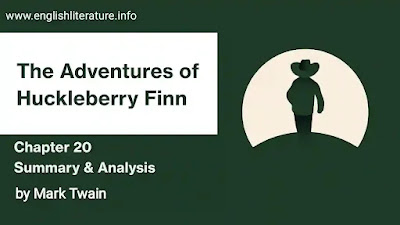Also Read
SUMMARY
The two men suspect that Jim is a runaway nigger. Huck immediately cooks another one of his stories. He says that Jim is their slave. His father had been under heavy debt and, after clearing it, didn't have much money left to sustain the family. So they were going to his Uncle s house in Orleans. Unfortunately, a steamboat had run over them and his father, being drunk, had got drowned. His four-year old brother was too young to be able to swim. Huck says that slave hunters were always on the prowl for runaway slaves and, misconstruing Jim to be one of them, would bother them during the day. So they preferred to travel at night. Assuring them that they would find a way out of this mess, the Duke tells them to relax. Then, leaving Huck and Jim to keep watch, they go to bed.
The next morning the Duke declares that they would enact a couple of scenes from Shakespeare's plays, Richard II and the "Balcony Scene in Romeo and Juliet to raise some money. The Duke demonstrates how to begin and they commence learning their parts by heart. He says that, since he has played the part of Romeo on many occasions earlier, he would do a better job of it. Therefore, he suggests, the "King" could enact Juliet. The "King" protests because it won't be credible it they make an old bearded man play the part of a fair, young and beautiful girl. The "Duke" manages to allay all his fears and assures him that the "country jakes" wouldn't have the sense to notice it.
They come to a small town that looks completely deserted. They learn that most of the people have gone for a camp meeting. The King along with Huck, goes to the camp meeting. Here they witness a spectacle where the audience listens to preaching that makes them indulge in a melodramatic display of emotions. After their histrionics, the King walks up to the stage and puts up another show. He pretends to be a pirate who has pledged to reform himself as well as all his peers in the Indian Ocean. For this, he collects contribution from the audience. The money amounts to eighty-seven dollars and seventy-five cents.
In the meanwhile, the Duke goes over to a printing press where he sets shop for some time. He sells some newspaper subscriptions to local farmers and collects nine dollars and fifty cents. He prints a poster offering 200 dollars for a runaway slave, whose description resembles that of Jim. He says they can use the poster to ward off anybody who approaches them to ask about Jim.
Jim doesn't feel too comfortable with the Duke and the Dauphin on board their raft. He hopes that they don't encounter any more such people.
CRITICAL ANALYSIS
The raft has, so far, been the only place in the world where Huck and Jim can find some peace. But with the intrusion of the Duke and Dauphin on the raft, the tranquil ambience gets sullied.
The zealously religious people consider church going as a suitable diversion to indulge in such pastimes. We are introduced to the scene of preaching where 'some of the old women was knitting, and some of the young folks was courting on the sly". This is the devotion that "devout Christians" demonstrate.
The scene in which the "King" swindles the congregation reveals another rationale for Twain to mock at the over-zealous religious lot. Instead of using their common sense to assess the credibility of the "pirate", the gullible lot is taken in by the "King" and donates to his cause. In their naivete, they have assumed a misplaced concept of Faith and God's Love. How could they be so thoughtless so as to believe him when he says, "he was home now to take out some fresh men, and thanks to goodness he'd been robbed last night and put ashore off of a steamboat without a cent, and he was glad of it; it was the blessedest thing that ever happened to him, because he was a changed man now, and happy for the first time in his life; and, poor as he was, he was going to start right off and work his way back to the Indian Ocean, and put in the rest of his life trying to turn the pirates into the true path".
This is reminiscent of the first chapter of the novel. Huck exhibits his pragmatic outlook by voicing his disapproval of the "good place" because it connotes a life that he can't relate to. For him, "seeing is believing". He doesn't exhibit any of the religious sentimentality and blind faith that characterizes the congregation or, for that matter, Miss Watson. He is better left alone to decide how he would judge situations and people.
